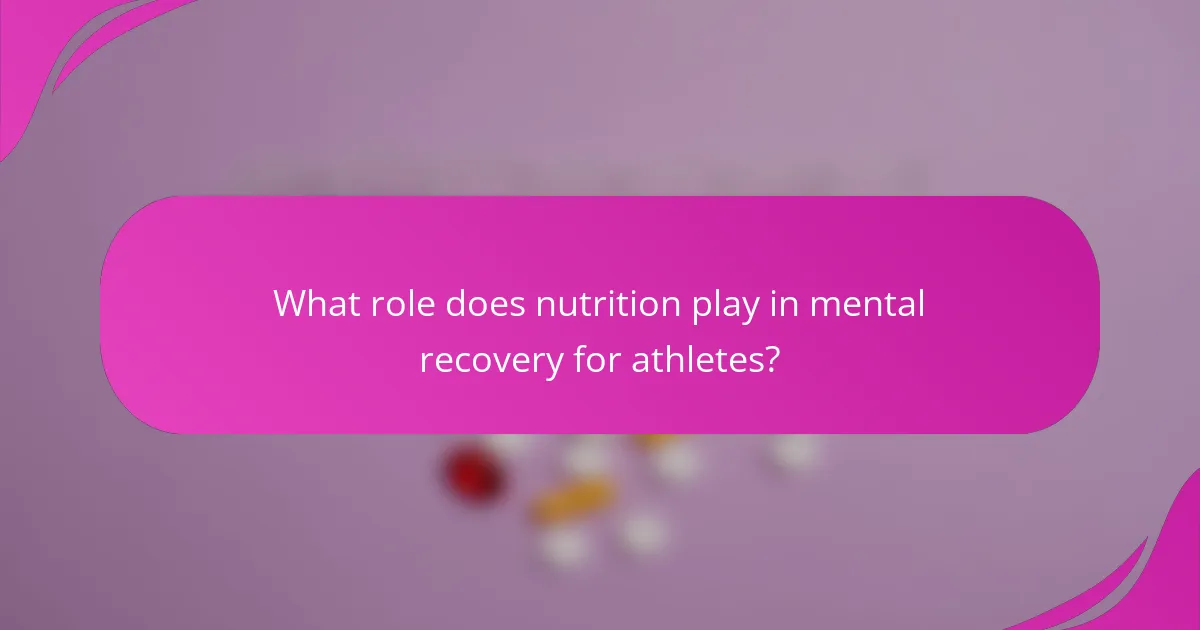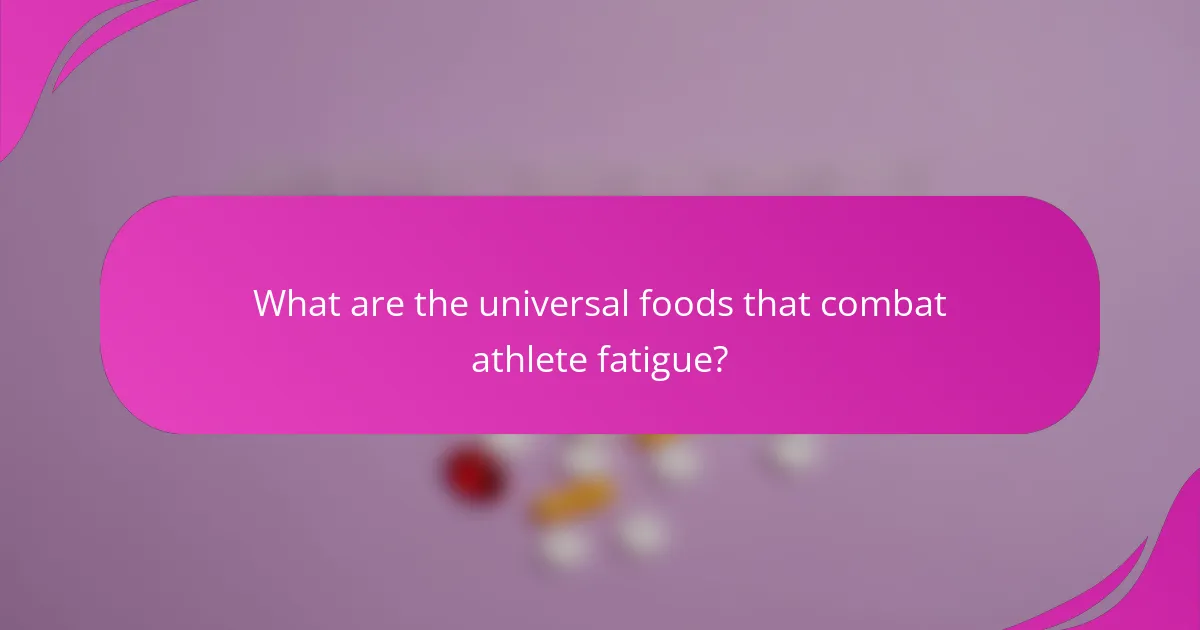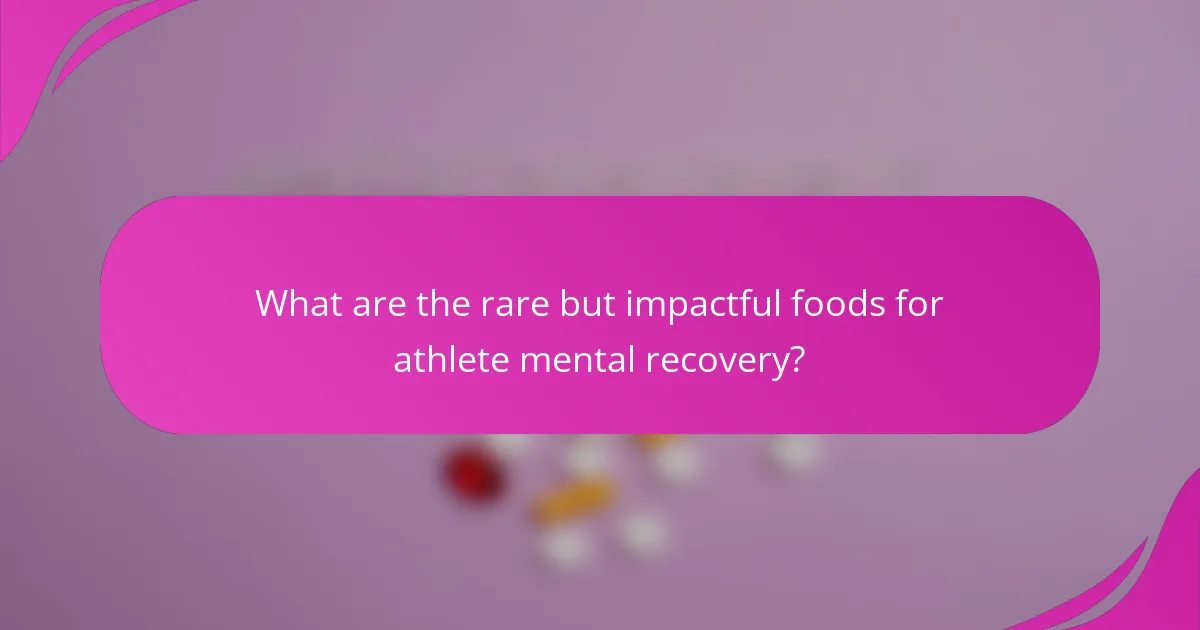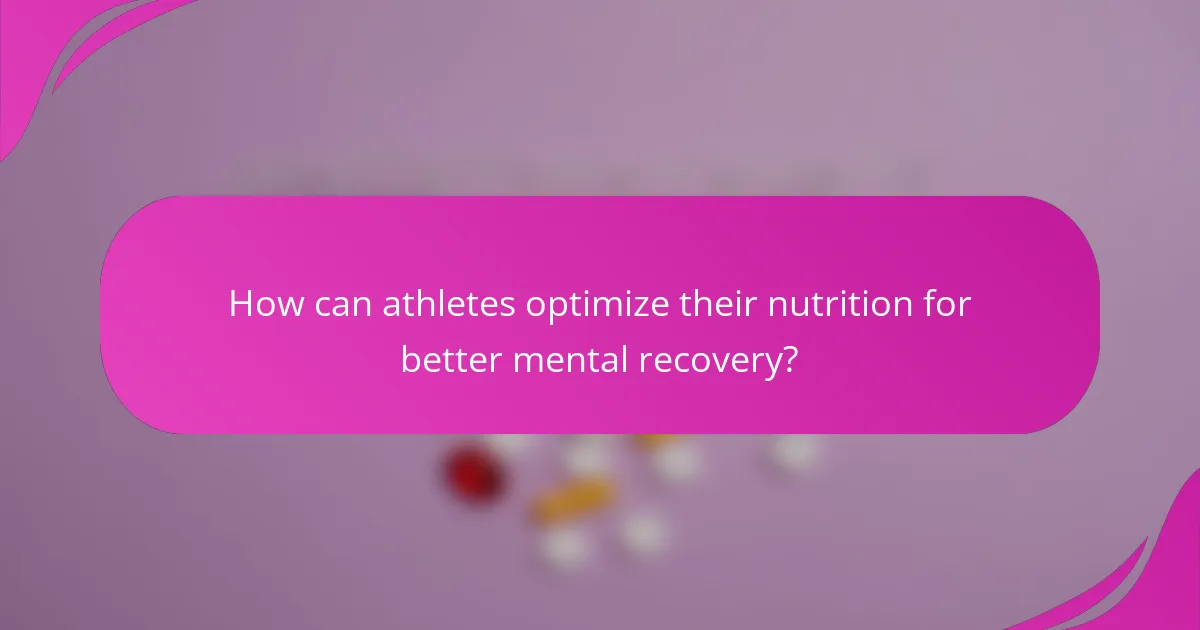Nutrition is vital for mental recovery in athletes, helping combat fatigue and improve performance. Key foods like omega-3-rich salmon and antioxidant-packed berries enhance cognitive function. Complex carbohydrates from whole grains provide sustained energy, while hydration supports overall brain health. Incorporating these elements into a balanced diet can significantly boost an athlete’s resilience and focus.

What role does nutrition play in mental recovery for athletes?
Nutrition plays a crucial role in mental recovery for athletes by providing essential nutrients that enhance cognitive function and reduce fatigue. Foods rich in omega-3 fatty acids, such as salmon, support brain health and mood regulation. Antioxidant-rich fruits and vegetables combat oxidative stress, which can impair mental performance. Complex carbohydrates, like whole grains, provide sustained energy and stabilize blood sugar levels, crucial for focus during recovery. Hydration is equally important; dehydration can lead to cognitive decline. Incorporating a balanced diet with these elements can significantly improve an athlete’s mental resilience and overall performance.
How does fatigue impact an athlete’s mental performance?
Fatigue significantly impairs an athlete’s mental performance by reducing focus, reaction time, and decision-making abilities. Nutrition plays a crucial role in mental recovery, with specific foods enhancing cognitive function and energy levels. For example, complex carbohydrates provide sustained energy, while omega-3 fatty acids support brain health. Hydration is also vital; even mild dehydration can negatively affect concentration. Incorporating nutrient-dense foods such as leafy greens, nuts, and lean proteins can help combat fatigue and optimize mental performance.
What are the key nutrients for mental recovery?
Key nutrients for mental recovery include omega-3 fatty acids, antioxidants, vitamins B6 and B12, magnesium, and amino acids. Omega-3s, found in fatty fish, support brain health. Antioxidants from fruits and vegetables reduce oxidative stress. B vitamins enhance energy metabolism and cognitive function. Magnesium helps regulate neurotransmitters, while amino acids are essential for neurotransmitter synthesis. A balanced diet rich in these nutrients can significantly aid in mental recovery and performance enhancement.
Which vitamins and minerals are essential for cognitive function?
Vitamins B, D, E, and minerals like magnesium and zinc are essential for cognitive function. These nutrients support brain health, enhance memory, and improve overall mental performance. For example, vitamin B12 is crucial for nerve function, while magnesium plays a role in synaptic plasticity. Regular intake of these nutrients through a balanced diet can combat athlete fatigue and boost performance.
How do macronutrients affect energy levels and mental clarity?
Macronutrients significantly influence energy levels and mental clarity. Carbohydrates provide quick energy, while proteins support neurotransmitter function. Healthy fats enhance brain health, improving cognitive performance. Balancing these macronutrients optimizes both physical and mental performance, essential for athletes recovering from fatigue.

What are the universal foods that combat athlete fatigue?
Foods that combat athlete fatigue include bananas, quinoa, spinach, sweet potatoes, and salmon. These foods provide essential nutrients that enhance energy levels and promote recovery.
Bananas are rich in potassium, aiding muscle function. Quinoa offers high protein and complex carbohydrates for sustained energy. Spinach contains iron, crucial for oxygen transport in the body. Sweet potatoes provide antioxidants and vitamins for overall health. Salmon is an excellent source of omega-3 fatty acids, reducing inflammation and supporting recovery.
Incorporating these foods into an athlete’s diet can significantly improve performance and reduce fatigue.
Which foods are known for their recovery benefits?
Foods known for their recovery benefits include fruits, vegetables, whole grains, lean proteins, and healthy fats. These foods provide essential nutrients that combat athlete fatigue and enhance performance.
Fruits like bananas and berries are rich in antioxidants and vitamins, which support muscle recovery. Leafy greens, such as spinach and kale, contain iron and calcium, crucial for energy levels. Whole grains provide complex carbohydrates, sustaining energy during workouts. Lean proteins, including chicken and fish, help repair muscle tissue. Healthy fats from sources like avocados and nuts reduce inflammation and promote overall health.
Incorporating these foods into a balanced diet can significantly improve recovery times and athletic performance.
What are the top fruits and vegetables for mental recovery?
The top fruits and vegetables for mental recovery include blueberries, spinach, walnuts, and avocados. These foods are rich in antioxidants, omega-3 fatty acids, and vitamins that support cognitive function and reduce fatigue.
Blueberries enhance memory and protect the brain from oxidative stress. Spinach provides folate, crucial for neurotransmitter function. Walnuts are high in omega-3s, which improve mood and cognitive performance. Avocados contain healthy fats that promote blood flow to the brain.
Incorporating these foods into a diet can significantly aid in mental recovery and overall athletic performance.
How do whole grains support sustained energy?
Whole grains provide sustained energy by releasing carbohydrates slowly into the bloodstream. This gradual release helps maintain stable blood sugar levels, preventing energy crashes. Whole grains, rich in fiber, also promote digestive health, which supports overall energy levels. For athletes, consuming whole grains can enhance endurance and recovery by providing essential nutrients like B vitamins, iron, and magnesium.
What beverages enhance mental performance post-activity?
Beverages that enhance mental performance post-activity include electrolytic drinks, green tea, and smoothies rich in omega-3 fatty acids. Electrolytic drinks replenish lost minerals, improving hydration and cognitive function. Green tea contains L-theanine and caffeine, promoting alertness and focus. Smoothies with omega-3s support brain health and reduce fatigue.

What unique foods specifically boost mental recovery?
Certain foods can significantly enhance mental recovery for athletes. Omega-3 fatty acids found in fatty fish like salmon support cognitive function. Antioxidant-rich berries help reduce oxidative stress. Leafy greens provide essential vitamins for brain health. Whole grains offer sustained energy, improving focus and performance. Nuts and seeds supply healthy fats and protein, aiding recovery. Dark chocolate enhances mood and cognitive function due to its flavonoid content.
How do superfoods contribute to cognitive enhancement?
Superfoods significantly enhance cognitive function by providing essential nutrients that support brain health. Nutrients like omega-3 fatty acids, antioxidants, and vitamins found in foods such as blueberries, fatty fish, and leafy greens improve memory and concentration. As a result, athletes can recover mentally from fatigue more effectively, boosting overall performance. Unique attributes of these foods include high levels of flavonoids in berries, which help reduce oxidative stress in the brain.
What unique properties do blueberries have for brain health?
Blueberries have unique properties that enhance brain health, particularly due to their high antioxidant content. They are rich in flavonoids, which improve cognitive function and may reduce the risk of neurodegenerative diseases. Research indicates that regular consumption of blueberries can enhance memory and delay brain aging. These effects are attributed to their ability to improve blood flow to the brain and reduce inflammation.
How does dark chocolate improve mood and focus?
Dark chocolate improves mood and focus due to its high flavonoid content, which enhances blood flow to the brain. Flavonoids increase the production of endorphins and serotonin, neurotransmitters that elevate mood. Additionally, dark chocolate contains caffeine and theobromine, which can boost alertness and concentration. Consuming dark chocolate in moderation can be a beneficial part of a nutrition strategy aimed at combating athlete fatigue and enhancing performance.

What are the rare but impactful foods for athlete mental recovery?
Rare but impactful foods for athlete mental recovery include foods rich in omega-3 fatty acids, such as mackerel and chia seeds, which enhance cognitive function. Adaptogenic herbs like ashwagandha and rhodiola rosea reduce stress and fatigue, promoting mental clarity. Fermented foods like kimchi and kefir support gut health, linking it to improved mood and focus. Dark chocolate, with its flavonoids, boosts serotonin levels, enhancing emotional well-being. Incorporating these foods can significantly aid mental recovery for athletes.
Which lesser-known foods should athletes consider?
Athletes should consider lesser-known foods like spirulina, amaranth, and fermented foods for mental recovery and performance enhancement. Spirulina is rich in protein and antioxidants, amaranth provides essential amino acids, and fermented foods support gut health. These foods combat fatigue and enhance overall well-being.
What benefits do adaptogens like ashwagandha provide?
Adaptogens like ashwagandha provide several benefits for mental recovery and athletic performance. They help reduce stress, enhance endurance, and improve overall cognitive function. Ashwagandha specifically can lower cortisol levels, which aids in recovery from fatigue. Additionally, it may enhance focus and concentration, allowing athletes to perform better under pressure.
How can fermented foods influence mental health?
Fermented foods can enhance mental health by promoting gut health, which influences mood and cognitive function. Probiotics found in these foods, such as yogurt and kimchi, can reduce symptoms of anxiety and depression. Studies suggest a connection between gut microbiota and brain health, highlighting the importance of these foods in athlete recovery. Regular consumption may lead to improved performance by alleviating fatigue and supporting overall mental well-being.

How can athletes optimize their nutrition for better mental recovery?
Athletes can optimize their nutrition for better mental recovery by focusing on foods rich in antioxidants, omega-3 fatty acids, and complex carbohydrates. These nutrients help reduce inflammation, enhance brain function, and stabilize energy levels.
Incorporating foods like berries, fatty fish, and whole grains can significantly aid recovery. For example, blueberries provide antioxidants that combat oxidative stress, while salmon offers omega-3s that support cognitive health. Complex carbohydrates, such as oats, help maintain stable blood sugar levels, preventing fatigue.
Hydration is also crucial. Adequate fluid intake supports overall brain function and recovery. Electrolyte-rich beverages can replenish lost minerals during intense training sessions.
Lastly, timing meals around training can enhance recovery. Consuming a balanced meal or snack within 30 minutes post-exercise optimizes nutrient absorption, aiding both physical and mental recovery.
What are the best practices for meal timing around workouts?
To optimize meal timing around workouts, consume a balanced meal 2-3 hours prior and a protein-rich snack within 30 minutes post-exercise. This strategy enhances mental recovery and combats fatigue. Pre-workout meals should include carbohydrates for energy and protein for muscle support. Post-workout nutrition aids in recovery and performance enhancement.
What common mistakes should athletes avoid in their nutrition?
Athletes should avoid several common nutritional mistakes to enhance mental recovery and performance. Skipping meals can lead to fatigue and hinder recovery. Over-relying on processed foods lacks essential nutrients. Neglecting hydration affects cognitive function and endurance. Ignoring individual dietary needs can result in suboptimal performance. Lastly, consuming excessive sugar may lead to energy crashes.
How can personalized nutrition plans enhance recovery?
Personalized nutrition plans significantly enhance recovery by tailoring food intake to meet individual physiological needs. These plans can combat athlete fatigue through specific nutrient timing and composition, improving energy levels and mental clarity. For example, incorporating antioxidants from berries can reduce oxidative stress, while protein-rich foods aid muscle repair. As a result, athletes experience faster recovery times and improved performance in subsequent training sessions.
What expert insights can improve nutritional strategies for athletes?
Incorporating expert insights can significantly enhance nutritional strategies for athletes, focusing on mental recovery and fatigue management. Key foods that combat fatigue include omega-3 rich fish, which reduce inflammation, and complex carbohydrates like quinoa, providing sustained energy. Antioxidant-rich fruits, such as berries, support recovery by mitigating oxidative stress. Incorporating these foods can lead to improved performance and mental clarity, essential for athletes.